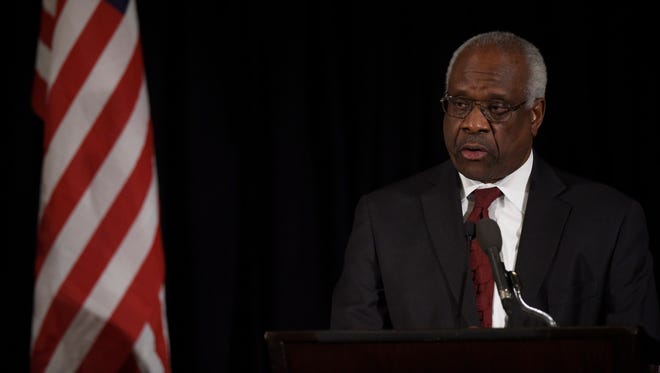Justices Thomas, Alito form conservative partnership
WASHINGTON — There's a fledgling new partnership on the Supreme Court in the wake of Justice Antonin Scalia's death last month.

Three times on Monday, Justices Clarence Thomas and Samuel Alito jointly expressed opposition or reservations to high court actions supported in full by the remaining six justices.
Thomas and Alito dissented from the court's decision to reverse a 14-year-old death sentence for murder and grant the defendant a new trial because prosecutors withheld evidence. The court took that action without hearing the case, something the two conservative justices said it should have done first.
The pair also dissented from the court's refusal to hear a free-speech case out of Seattle in which the county government blocked a controversial advertisement targeting terror suspects from its public transit system. They said they would have granted the challenge from an advocacy group seeking to post its "Faces of Global Terrorism" ad on city buses.
Alito on 8-member court: 'We will deal with it'
Finally, Thomas and Alito agreed that the Supreme Court's recent decision against mandatory life sentences for juvenile murderers requires new hearings in state or lower federal courts for prisoners sentenced years or even decades ago. But they wrote separately in each case to specify that state courts still can decide the life sentences were deserved.
Justice Thomas breaks 10-year silence in court
They did the same thing a week earlier, agreeing with the court's refusal to decide if California's unclaimed property law provides sufficient notice to potential owners before seizing assets, but warning that states' tendencies toward shorter time periods and scant notification may merit review in the future.
Taken together, the dissents and concurrences revealed two early trends that could develop further as the court tries to function with only eight members for what could be a year or more, given Senate Republicans' vow to block anyone President Obama nominates. First, Scalia's death has left Thomas and Alito alone on the court's ideological right flank. And second, it has made it more likely that conservatives — rather than liberals, as was expected this term — will be on the losing side of decisions.
The two conservatives also appear to be sending a message to Chief Justice John Roberts, who has presided over a decline in the number of cases the high court hears annually. In the Louisiana death sentence case that was reversed, Alito wrote, "There is room on our docket to give this case the careful consideration it deserves."
Thomas, in particular, has shown signs of taking Scalia's death hard. At a memorial service last week, he recalled the "many buck-each-other-up visits, too many to count" between himself and "brother Nino" -- two justices who often found themselves in the minority on important cases.
He also has become more assertive in Scalia's absence, peppering a federal government lawyer with questions last week in a gun rights case after going more than 10 years without asking a single question.
In the Louisiana case Monday, the court's unsigned opinion said evidence withheld by prosecutors rendered the state's case against Michael Wearry "a house of cards." He should not have to stay on death row, the court said, "in service of a conviction that is constitutionally flawed."

Alito, an ex-prosecutor who is tough on crime (whereas Scalia often protected the rights of criminal defendants), agreed the prosecution should have disclosed more evidence. But he said the court "downplays the considerable evidence of petitioner's guilt."
In a dissent joined by Thomas, he said Louisiana "should be given the opportunity to make its full case."
In the free speech case that the justices refused to hear, Thomas cited deep divisions among federal appeals courts that prohibit content-based restrictions in New York City, Chicago, Detroit and Washington, D.C., but not in Boston and Seattle.
"To be sure, this case involves speech that some may consider offensive, on a politically charged subject," Thomas said, joined by Alito. "That is all the more reason to grant review."
Juveniles given life sentences for murder win high court reprieve
In the cases involving prisoners sentenced to die in prison when they were juveniles, Scalia had joined Thomas and Alito in opposing the court's January decision striking down mandatory life sentences. The late justice called it "a devious way of eliminating life without parole for juvenile offenders."
In all, the Supreme Court sent 40 such cases back Monday to lower courts in Alabama, Louisiana, Michigan, Virginia and Minnesota for rehearings. Each time, Thomas and Alito clarified that the action "does not reflect any view regarding petitioner's entitlement to relief."